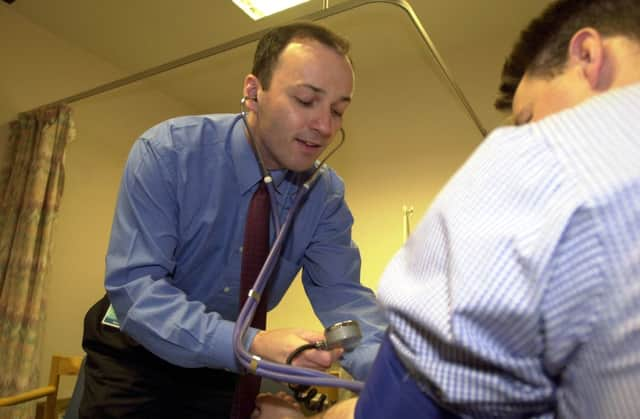There is a new way to help heart failure


Can you imagine feeling so weak and debilitated that you can’t get out of your armchair and cross your own living room? And if you were to do so, that it would leave you feeling utterly exhausted?
This is the reality for thousands of people who are living with advanced heart failure and, sadly, there is no cure.
Advertisement
Hide AdAdvertisement
Hide AdWhile it’s great news that deaths from coronary heart disease are falling – in the past 30 years death rates have dropped by over 70 per cent – unfortunately more people are living with heart failure.
Heart failure does not mean your heart suddenly stops. It means that the heart’s pumping action is impaired, so not enough blood and oxygen are reaching the parts of your body where they are needed.
This often leads to symptoms such as breathlessness and swollen feet and ankles. It can leave you feeling unusually tired. Feelings of isolation and depression can follow.
It’s most commonly caused by a heart attack, high blood pressure or a disease of the heart muscle called cardiomyopathy. But heart failure can also be caused by congenital heart disease, heart valve problems and a viral infection affecting the heart muscle.
Around 69,000 Scots are living with heart failure and it’s a debilitating, frightening and life-limiting condition.
In Glasgow, people with advanced heart failure are benefiting from a unique partnership between BHF Scotland and Marie Curie Cancer Care. We’ve joined forces with NHS Greater Glasgow and Clyde to ensure that people with advanced heart failure get better palliative care through our Caring Together programme.
Heart failure does not just affect the individual – it happens to the entire family.
Through Caring Together, people’s medical and social needs are comprehensively assessed and their clinical care is co-ordinated by a care manager. Patients receive care in their chosen place, which is often at home.
Advertisement
Hide AdAdvertisement
Hide AdThey also receive advice and support – for example about benefits they may claim – to ensure they are able to remain at home as long as they wish.
Many people have benefitted from day therapies at the three hospices on the Caring Together pilot sites at the Marie Curie Hospice, the Prince and Princess of Wales Hospice in Glasgow and at Ardgowan Hospice in Greenock.
Over 230 patients have been referred to Caring Together in its first two years, since June 2011. Caring Together patients are more likely to be cared for, and to die, in their preferred place.
The support they receive means that hospital admission, or a lengthy stay in hospital, is avoided.
When asked to describe the difference that the Caring Together programme and its nurses have made, patients have said, “she gives me a lot of confidence” and “all of them are excellent, just excellent”.
All of the partners are delighted that Caring Together is being extended by 18 months to June 2015 to build on its success.
Independent research and evaluation will assess its impact and be used to build recommendations for how such care can be improved elsewhere.
BHF Scotland and Marie Curie Cancer Care are campaigning vigorously on behalf of families affected by heart failure.
Advertisement
Hide AdAdvertisement
Hide AdWe have contributed to the Scottish Government’s updated Better Heart Disease and Stroke Care Action Plan, due to be published in April, which will include palliative care in heart disease.
As people are living longer, and we become more and more successful in treating cardiovascular disease, increasing numbers of people are going to be affected by heart failure so it’s absolutely vital that these services are provided on a sustainable basis for every person who needs them.
• Iain Armstrong is Programme Manager, Caring Together (Marie Curie Cancer Care and British Heart Foundation Scotland) and Marjory Burns is Director, British Heart Foundation Scotland